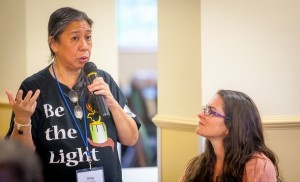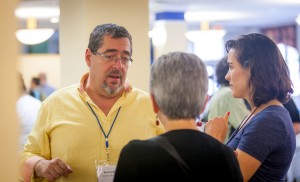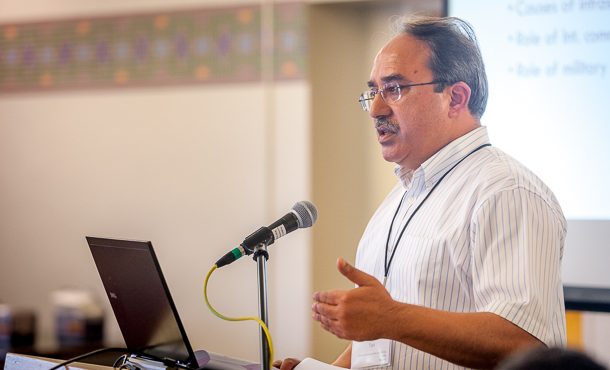How can peacebuilders engage with the police and military in pursuing peace? And how can police and the military engage with peacebuilders? That was the topic of a luncheon presentation by experts from Pakistan, the Philippines and Guatemala at Eastern Mennonite University (EMU) during the Summer Peacebuilding Institute.
“Peace activists tend to be sensitive to interacting with the military and police,” said EMU professor Lisa Schirch, as she introduced the speakers. “We often define security in a different way, focused on ‘human security.’” But she believes the two sides can – and must − work together even in countries where the security forces are part of a repressive government.
“We’ve come a long way in civil society to move from protesting security policies to making policy proposals for how to better pursue human security,” said Schirch, who has been invited to speak at the Pentagon, the Army War College and West Point Military Academy. She noted that several Harrisonburg Police Department officers were guests at the luncheon.
A research professor at EMU’s Center for Justice and Peacebuilding (CJP), Schirch is also director of human security at the Alliance for Peacebuilding, an international network of peacebuilding practitioners and scholars that promotes “sustainable peace and security.”
Schirch and many of the luncheon attendees are currently involved in the final phase of a three-year project: the creation of a master curriculum, including a handbook and training modules, to help security forces and civil society groups learn how to collaborate on human security, community engagement and security sector development. The project, supported by the Rockefeller Brothers Fund, partners the Alliance for Peacebuilding with the Global Partnership for the Prevention of Armed Conflict and the Kroc Institute for International Peace Studies at the University of Notre Dame.
Approximately 30 contributors travelled from 26 countries for the one-week “training of trainers” on the EMU campus. The luncheon speakers, who were part of the training session, spoke about their experiences engaging with military and police.
Reforming police practices
Kamal Uddin Tipu started his career as a police officer in Pakistan, eventually rising to deputy inspector general in the city of Islamabad. He came to CJP as a Fulbright scholar in 2004 to earn a master’s degree.
At EMU, Tipu focused on restorative justice as a better way to deal with crime, law-breakers and victims. He spoke fondly of his time on campus, his family’s experiences while living in Harrisonburg, and his internship with the police department in Rochester, New York. He returned to Pakistan to implement what he had learned, introducing reforms in local police practices.
In recent years, Tipu went to Africa as a police adviser to the African Union and United Nations. “I saw how we need to focus more on the root causes of conflict,” he said. “I also saw the enormous amounts of money that countries spend on the military.”
A ‘peace general’

Deng Giguiento, a longtime peacebuilding trainer and practitioner, counts two generals as her friends on the Philippine island of Mindanao. As training coordinator for the Peace and Reconciliation Program of Catholic Relief Services, she often interacted with security officials on local situations of conflict.
When a German couple was abducted by anti-government insurgents, for example, she helped negotiate their release alongside an army general. The general had rejected military action, despite opposition from his officers. Afterwards, the general started a class for his officers. His textbook was “The Little Book of Conflict Transformation,” written by John Paul Lederach, founding director of CJP.
“When the general got stuck, he would call me and put me on speakerphone,” said Giguiento, who helped to establish the Mindanao Peacebuilding Institute after attending SPI in 1997.
Moving from protest to proposals

Bernardo Arevalo de Leon, a former Guatemalan diplomat, talked about how his country is still trying to recover from a 33-year civil war between armed rebels and a repressive right-wing government. After 10 years of peace talks, the two sides signed a peace accord in 1996, but the country is struggling to implement reforms that were promised.
“The big task is to transform the way the government uses its security forces,” said de Leon, who was involved in the peace process. “We needed to think differently about the role of the police and the army.”
He also pointed out that civil society needed to move from protest to proposal to engage in the reform of the security sector.
De Leon is now based in Guatemala, where he is director of the Regional Office for Latin America for Interpeace, a global peacebuilding nongovernmental organization based in Geneva.
